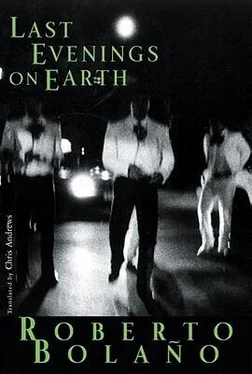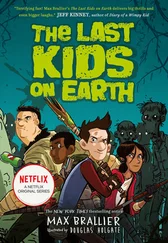Roberto Bolano
Last Evenings On Earth
The way in which my friendship with Sensini developed was somewhat unusual. At the time I was twenty-something and poorer than a church mouse. I was living on the outskirts of Girona, in a dilapidated house that my sister and brother-in-law had left me when they moved to Mexico, and I had just lost my job as a night watchman in a Barcelona campground, a job that had exacerbated my tendency not to sleep at night. I had practically no friends and all I did was write and go for long walks, starting at seven in the evening, just after getting up, with a feeling like jet lag — an odd sensation of fragility, of being there and not there, somehow distant from my surroundings. I was living on what I had saved during the summer, and although I spent very little my savings dwindled as autumn drew on. Perhaps that was what prompted me to enter the Alcoy National Literature Competition, open to writers in Spanish, whatever their nationality or place of residence. There were three categories: for poems, stories, and essays. First I thought about trying for the poetry prize, but I felt it would be demeaning to send what I did best into the arena with the lions (or hyenas). Then I thought about the essay, but when they sent me the conditions, I discovered that it had to be about Alcoy, its environs, its history, its eminent sons, its future prospects, and I couldn't face it. So I decided to go for the story prize and sent off three copies of the best one I had (not that I had many) and sat down to wait.
When the winners were announced I was working as a vendor in a handcrafts market where absolutely no one was selling anything handcrafted. I won fourth prize and ten thousand pesetas, which the Alcoy Council paid with scrupulous promptitude. Shortly afterward I received the anthology, with the winning story and those of the six finalists, liberally peppered with typos. Naturally my story was better than the winners, so I cursed the judges and told myself, Well, what can you expect? But the real surprise was coming across the name Luis Antonio Sensini, the Argentinean writer, who had won third prize with a story in which the narrator went to the countryside and when he got there his son died, or went away to the country because his son had died in the city — it was hard to tell — in any case, out there in the countryside, on the bare plains, the narrator's son went on dying, that much was clear. It was a claustrophobic story, very much in Sensini's manner, set in a world where vast geographical spaces could suddenly shrink to the dimensions of a coffin, and it was better than the winning story and the one that came in second, as well as those that came in fourth, fifth, and sixth.
I don't know what moved me to ask the Alcoy Council for Sensini's address. I had read one of his novels and some of his stories in Latin American magazines. The novel was the kind of book that finds its own readers by word of mouth. Entitled Ugarte, it was about a series of moments in the life of Juan de Ugarte, a bureaucrat in the Viceroyalty of the Rнo de la Plata at the end of the eighteenth century. Some (mainly Spanish) critics had dismissed it as Kafka in the colonies, but gradually the novel had made its way, and by the time I came across Sensini's name in the Alcoy anthology, Ugarte had recruited a small group of devoted readers, scattered around Latin America and Spain, most of whom knew each other, either as friends or as gratuitously bitter enemies. He had published other books, of course, in Argentina, and with Spanish publishers who had since gone broke, and he belonged to that intermediate generation of Argentinean writers, born in the twenties, after Corta-zar, Bioy Casares, Sвbato, and Mыjica Lainez, a generation whose best-known representative (to me, back then, at any rate) was Haroldo Conti, who disappeared in one of the special camps set up by Videla and his henchmen during the dictatorship. It was a generation (although perhaps I am using the word too loosely) that hadn't come to much, but not for want of brilliance or talent: followers of Roberto Arlt, journalists, teachers, and translators; in a sense they foreshadowed what was to come, in their own sad and skeptical way, which led them one by one to the abyss.
I had a soft spot for those writers. In years gone by, I had read Abelardo Castillo's plays and the stories of Daniel Moyano and Rodolfo Walsh (who was killed under the dictatorship, like Conti). I read their work piecemeal, whatever I could find in Argentinean, Mexican, or Cuban magazines, or the secondhand bookshops of Mexico City: pirated anthologies of Buenos Aires writing, probably the twentieth century's best writing in Spanish. They were part of that tradition, and although, of course, they didn't have the stature of Borges or Cortвzar, and were soon overtaken by Manuel Puig and Osvaldo Soriano, their concise, intelligent texts were a constant source of complicit delight. Needless to say, my favorite was Sensini, and having been his fellow runner-up in a provincial literary competition — an associacomply with Sensini's request. Over the next few days, when I went down to Girona, I spent hours looking through back copies of newspapers in search of announcements. Some papers put them in a column next to the society news; in others, they came after the crime reports and before the sports section; the most serious paper had them wedged between the weather and the obituaries. They were never with the book reviews, of course. In my search I discovered a magazine put out by the Catalonian government, which, along with advertisements for scholarships, exchanges, jobs, and postgraduate courses, published announcements of literary competitions, mostly for Catalans writing in Catalan, but there were some exceptions. I soon found three for which Sensini and I were eligible, and they were still open, so I wrote him a letter.
Like the first time, I received a reply by return mail. Sensini's letter was short. He answered some of my questions, mainly about the book of stories I had recently bought, but also included photocopies of the details for three more short-story competitions, one of which was sponsored by the National Railway Company, with a tidy sum for the winner and "50,000 pesetas per head" (as he put it) for the ten finalists: no prize for dreaming, you have to be in it to win it. I wrote back saying I didn't have enough stories for all six competitions, but most of my letter was about other things (in fact I got rather carried away): travel, lost love, Walsh, Conti, Francisco Urondo… I asked him about Gelman, whom he was bound to have known, gave him a summary of my life story, and somehow ended up going on about the tango and labyrinths, as I always do with Argentineans (it's something Chileans are prone to).
Sensini's reply was prompt and voluble, at least as far as writing and competitions were concerned. On one sheet, recto and verso, single-spaced, he set out a kind of general strategy for the pursuit of provincial literary prizes. I speak from experience, he wrote. The letter began with a blessing on prizes (whether in earnest or in jest, I have never been able to tell), those precious supplements to the writer's modest income. He referred to the sponsors — town councils and credit unions — as "those good people with their touching faith in literature" and "those disinterested and dutiful readers." He entertained no illusions, however, about the erudition of the "good people" in question, who presumably exercised their touching faith on these ephemeral anthologies (or not). He told me I must compete for as many prizes as possible, although he suggested I take the precaution of changing a story's title if I was entering it for, say, three competitions that were due to be judged around the same time.
Читать дальше












